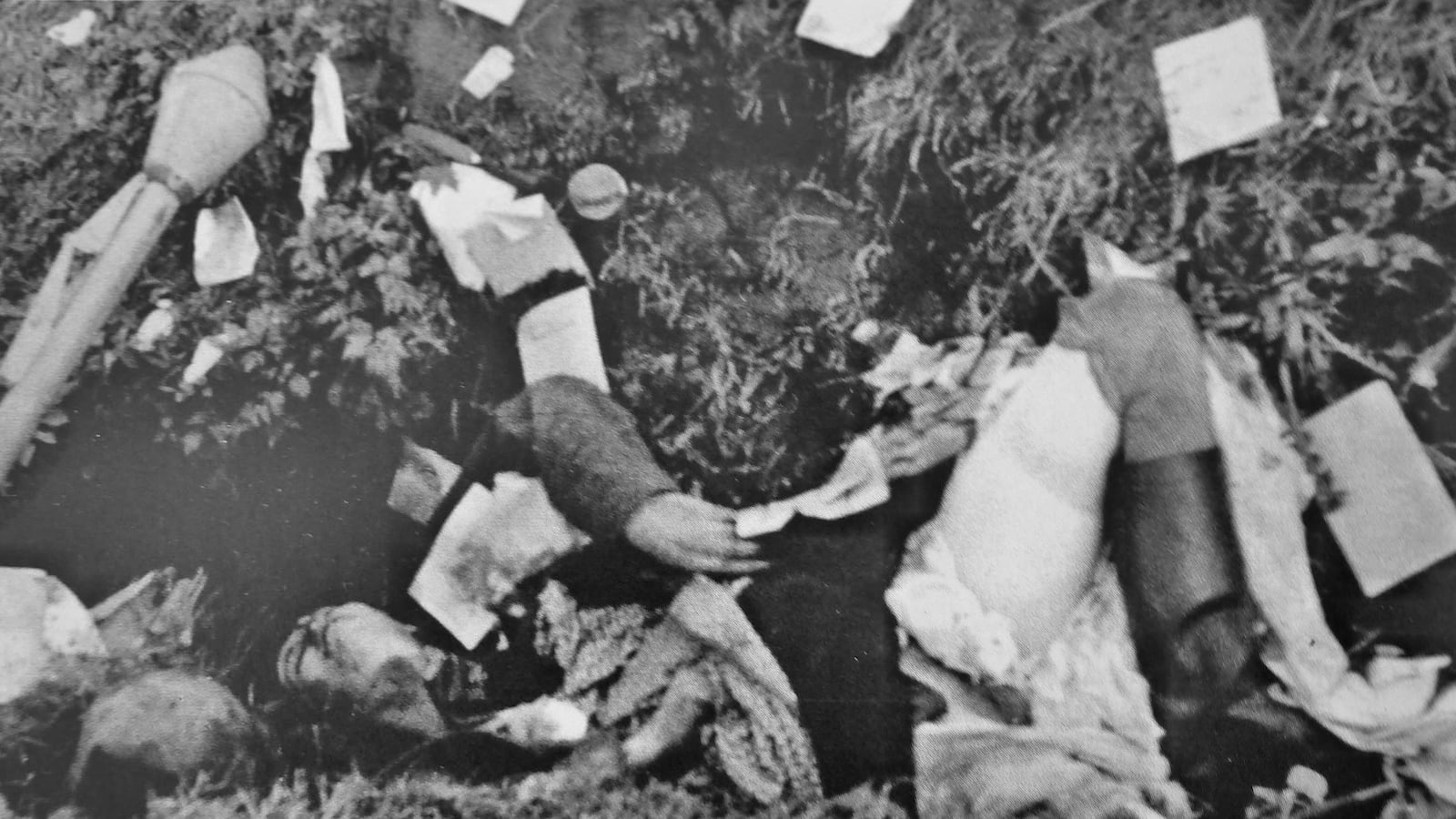A few years ago I attended a party for World War II veterans at a friend's home on the anniversary of D-Day. It was a relatively sedate affair: a few surprisingly short men from the Greatest Generation sitting around, trading stories about work and life—not much talk of war. Then one of the men, Tony, brought out a book of his photographs, black-and-white snaps he'd taken while he was with the 83rd Infantry.
The photographs were, by turns, fascinating and beautiful and horrible, as war photos tend to be. And then I encountered one that looked less like an image of battle than of a crime scene. Almost casually, Tony pointed to the photo, leaned over toward me, and started talking about it. None of the other veterans paid much attention, as if they'd heard the story already, and Tony was nonchalant, as though his story wouldn’t be any particular revelation. It was a part of his war, the “Good War,” and he'd been living with it for 65 years.
The image showed a beautiful woman in an elegant dress—“fine silks,” Tony said; “she must have been high society”—lying in blood, her legs twisted under her. It could have been one of Weegee's portraits of murder victims from the 1930s Lower East Side, except an anti-tank rocket, almost as long as she was, was lying beside her.
Tony had come upon her on May 8, 1945, the day of the German surrender. She had been disarmed before she could fire and then raped. Tony pointed out one particularly grisly detail of the photo: "You see here. This is a knife. The handle of the knife is dark, you see. Then you see gray, and a little white, there. OK. This gray is red blood. That knife was stuck in her vagina. Now, if she was dead, that blood would not be there. Do you understand? The blood was running, which means she was still alive when someone stuck that thing in her and killed her.
“And I cried. Tears came to my eyes. But one of the problems was her. She was ready to knock out an American tank ... So kill her, but they should not have played around with her vagina—this hurt me. Because it showed me how little mankind is in 1945."
Tony explained that he felt obliged to photograph the woman, to document what had happened. There was little hope there'd be any other acknowledgment of the crime or punishment for her rapists and murderers. Before he took the picture, though, he removed the knife from between her legs. He wanted to leave her some dignity while still recording the event. Almost immediately, he felt he'd done something wrong. Sanitized the scene. He held the knife in his hand, understood that putting it back was beyond his capacities, and lay it on the ground by her left shoulder. Then he took his photo.

This was not the kind of story I expected to hear that night. I've read enough military history to know such events are not uncommon during wartime, and the recently published What Soldiers Do, about the wave of rapes by GIs in France in 1944–45, attests that they were hardly uncommon, even when GIs were among the Allied population. But I didn’t expect anything like Tony’s story to come out, to me, on a night like that. It felt horrific, shameful, and abhorrent. If someone else had told the story, not a veteran and witness but a civilian, I would have felt they were being crass, even dishonorable. I would have suspected them of narrow-minded political motives. Maybe, if I was feeling especially piqued, I would have argued that such events were rare, and that such an act, awful as it was, was nothing compared with the abuses of the Nazis or the Soviets.
But Tony had been there.
Thirty-eight years ago, literary critic and World War II veteran Paul Fussell argued that soldiers often refuse to tell their war stories because they "have discovered that no one is very interested in the bad news they have to report." Fifteen years ago, Steven Spielberg felt the need to justify his inclusion of a momentary depiction of American soldiers executing surrendering enemy troops in Saving Private Ryan, because even in a film that for the most part glorifies the war and the Americans who fought it, these token moments of atrocity were too much for some viewers. "I don't want to turn Americans away from the patriotism many of us feel," he said, "but in the process of the chaos of combat, these were some of the things men were driven to do.''
After the fighting is done, and even when it’s still happening, apologies are often needed for the recounting of bare facts. Sometimes bare facts feel unpatriotic.
So why report those facts? Isn't it more important that these are the men who stormed the beaches at D-Day, lifted the flag at Iwo Jima, and liberated Auschwitz? As of this writing, five of the top 10 bestselling history books on Amazon are about World War II. The publisher's descriptions of these books are telling. One is a story of "survival, resilience, and redemption." Another, about women who contributed to the Manhattan Project, describes "their pluck, their desire to contribute, and their enduring courage." Another is an "incredible true story of combat and chivalry," and another is a "chronicle of the war that unshackled a continent and preserved freedom in the West."
It's no wonder then that Iraq vets like myself still feel under the shadow of World War II. Valor and resilience and triumphs of the human spirit abound in stories of Iraq (just look up Bradley Kasal or Jason Dunham or Ross McGinnis or Paul R. Smith), but their stories are off on the side, somewhere, along with similar ones from the other American wars about which we aren't allowed to feel unabashed pride. Korea, I suppose, is the forgotten war, Vietnam the bad war, the Persian Gulf the blink-and-you-missed-it war, and Iraq, as our president famously put it, the stupid war.
At a panel discussion with other veteran authors discussing our recent anthology of veterans’ fiction, Fire and Forget, one of the participants talked about the moral ambiguity of the Iraq War as contrasted with the clarity of World War II. I couldn't help but think of that story of the German woman. My war, during which the Marines I worked with desperately tried to restore order to a society in the grip of a savagely violent insurgency, is ambiguous. World War II, during which we interned our own Japanese-American citizens, conducted systematic area bombings of civilians, regularly killed enemy prisoners of war, mutilated war dead, and perpetrated a shocking number of rapes in both the European and Pacific theaters, is unambiguous.
Without excusing any abuses committed in Iraq, such as the widespread use of torture in interrogations, it's fairly clear that modern American soldiers have behaved with notable restraint and professionalism. Which makes sense. These wars are fought with an all-volunteer, professional military under the often-critical eye of both national and international press. The First Battle of Fallujah was called off in part because of the intensity of non-U.S. media coverage of civilian casualties from outlets like Al Jazeera. This is a far cry from the days when, as Fussell put it, "no Marine was fully persuaded of his manly adequacy who didn't have a well-washed Japanese skull to caress and who didn't have a go at treating surrendering Japs as rifle targets."
I'm not anti-war. I served in a war, and I served proudly. But just or not, necessary or not, war is the industrial-scale slaughter of other humans. Which is perhaps why historical memory of war is so often at odds with the lived experience.
I don't believe in any Greatest Generation. I believe in great events. They sweep ordinary people up, expose them to extremes of human behavior and unimaginable tests of integrity and courage, and then deposit them back on the home front. Which is when we start telling ourselves stories about what it all meant.






